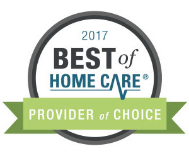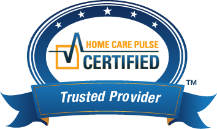Long-Distance Caregiving: Planning for Your Parent’s Future

One of the biggest challenges for family members of an elderly parent, whether they live near their parents or long-distance, is how to help them think about and plan for their future healthcare preferences.
Making advance care plans is a key step for your parent to take to be sure that his or her healthcare preferences are known. Healthcare providers can only respect end-of-life wishes that are documented in the medical record. Advance care planning can help your family avoid some of the conflicts that can occur when family members disagree over treatment decisions, especially if you are not readily available to speak on behalf of a parent.
It may be easier to make certain decisions after discussing them with family, clergy members, or healthcare providers. Decisions about forgoing treatment, for instance, or ending life support, involve complex emotional issues and are hard for many people to make alone. As one caregiver put it, "So much of the task is wading through your own feelings—which complicates the actual decision-making about what to do."
When preparing care instructions for an elderly parent:
- Name a surrogate decision maker (a healthcare surrogate has the authority to make decisions on behalf of someone who is too ill to do so). Think about the practicality of naming a long-distance surrogate. If travel time, time zones, or a work schedule will interfere with acting on a parent's behalf, it may be wise to consider choosing a healthcare proxy that is closer to your parent's care location.
- Discuss and state which treatment results are desirable and which ones are unacceptable
- Discuss and plan what to do in an emergency
- Note preferences regarding any possible treatments, and whether a time-limited trial would be acceptable
- Talk to the doctor and surrogate about preferences, make sure each party is fully aware of care preferences, and include written instructions in the medical record
Advance care planning is an ongoing process. As an illness progresses and circumstances change, your parent may want to revisit his or her preferences. If so, be sure to update all written instructions and share the changes with healthcare providers and anyone who assists with care.
Try to approach decision-making tasks by recognizing that you are working with a parent, not for a parent. How will you know when the advance care plans are complete and that you have covered all the bases? A complete plan will:
- Be very specific and detailed and cover what is to be done in a variety of medical situations
- Name a healthcare proxy
- Be recorded in the medical record
- Be readily available to any caregiver in the home, nursing home, or hospital
Advance Directives, Living Wills, and Power of Attorney
What is the difference between an advance directive and a living will? The terms are confusing. Advance directives are oral and written instructions about future medical care should your parents become unable to make decisions. Each state regulates the use of advance directives differently. A living will is one type of advance directive. It takes effect when the patient is terminally ill.
Advance directives are not set in stone. A patient can revise and update the contents as often as he or she wishes. Patients and family members should discuss these decisions—and any changes in them—and keep the healthcare team informed. Everyone involved should be aware of their parents' treatment preferences. Because state laws vary, check with your Area Agency on Aging, a lawyer, or a financial planner. They may have information on wills, trusts, estates, inheritance taxes, insurance, Medicare, and Medicaid.
The person who has the authority to make medical decisions on another person's behalf is called a healthcare proxy. The terms "healthcare proxy" and "healthcare agent" or "surrogate" are used interchangeably. These responsibilities are called "durable" (for example, you may hear the phrase "durable power of attorney") because they remain in effect even if your parent is unable to make decisions. Most people designate a close friend or family member. Some people turn to a trusted lawyer or member of the clergy. The designated person should be able to understand the treatment choices. Know your parents' values and support their decisions.
The decision to name a healthcare proxy is extremely important. A written document, kept in the medical record and identifying the designated proxy, should always be up-to-date.
Durable medical power of attorney forms does not give explicit guidance to the proxy about what decisions to make. Many states have developed forms that combine the intent of the durable power of attorney and the intent of the living will. These combination forms may be more effective than either of the two used individually. Each State regulates advance directives differently, so you will need to consult with the physician, nurse, social worker, or family lawyer to know what is required. It's also a good idea to check to make sure that all financial matters, including wills and life insurance policies, are in order.
Information Long-Distance Family Should Have on Hand
Keeping organized is of benefit to both the caregiver and the care recipient. Taking some time out of a visit with parents to talk business will help create a file to readily keep on hand and update as needed. This list is just a starting point:
- Parents' full legal name and residence
- Parents' birth date and place
- Parents' Social Security number
- Past employer(s) and dates of employment
- Education and military records
- Parents' financial information including sources of income and assets and investment income (stocks, bonds, property)
- Parents' insurance policies, bank accounts, deeds, investments, and other valuables
- Parents' most recent income tax return
- Parents' debts, to whom, and when payments are due
- Parents' credit card and charge account names and numbers
Another aspect of long-distance caregiving that terrifies adult children, is planning for their parents' death. The news that a family member is dying is difficult to bear. When you hear that a parent has a terminal illness, you may be flooded with emotions: Sorrow, disbelief, anger, anxiety, and guilt for the logistical distance between you.
It can be hard to know what to do or what to say. Talk to your own friends, clergy, or colleagues. Just about everyone has experienced the serious illness and death of a beloved friend or family member. Exchanging stories can help you as you try to decide what you can do.
Contact your parent's doctor and talk to your own doctor as well to find out what will need to be done, the kinds of care that your mother or father is likely to need, and how you can arrange for it to happen. There is no single "right" way to approach the death of a loved one. Fortunately, many organizations are working to improve the lives of dying people and their families.
Be there for your parent when you can, but arrange for quality care for a loved one to ensure that daily needs are met in your absence.
Caring Companions At Home can assist you in finding the perfect caregiver during such difficult times. We offer personal care and one-on-one companion care services. Call us at 888-950-0750 for a free in-home assessment by one of our qualified Case Managers.

























